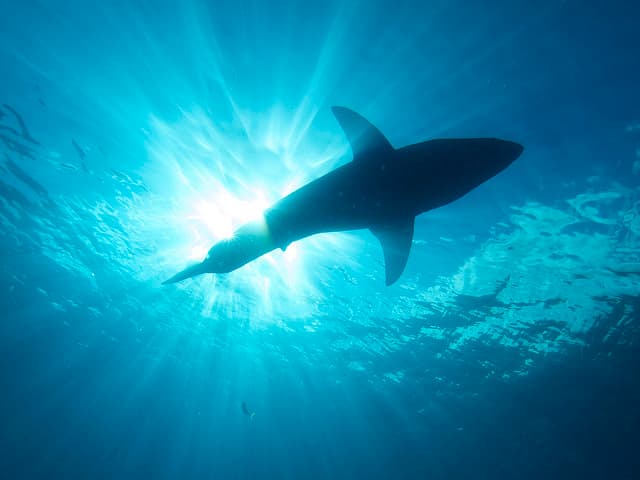More than half of shark species in the Mediterranean at risk: WWF

More than half of the 86 shark species in the Mediterranean sea are at risk of being wiped out due to careless fishing practices, the World Wildlife Federation warned on Thursday.
The accidental capture of sharks in trawl nets or fishing gear meant for commercial fishing is widespread, with sharks making up an estimated 10-15% of the fish caught by longlines intended for swordfish and tuna, according to La Stampa.
In 2015 an estimated 14.065 tons of sharks and rays in the Mediterranean were accidentally caught up in nets used by large trawlers, a phenomenon that also threatens dolphins, whales, sea turtles, and even sea birds.
The shark meat is then sometimes passed off as legal swordfish meat at market fish stalls, posing a food security risk.
READ ALSO: Mediterranean could become a 'sea of plastic', warns WWF
The WWF raised the alarm at the launch of its SafeSharks project at the 2018 Barcolana sailing regatta in the northeastern Italian port city of Trieste, which runs from October 5th to 14th and is now in its 50th year.
The SafeSharks project, a collaboration between the WWF and the organisations Coispa and Inca, will work with local fishermen and marine biologists to conduct research aimed at discovering the best way to release accidentally-caught sharks back into the sea in order to maximise their chances of survival.
Before being released back into the sea, the captured sharks will be tagged with a satellite tracking device that will provide researchers with information about their lifespan and movements, with the aim of securing areas used by the sharks for spawning and as nurseries.
As the devices cost approximately €5,000 a piece, the foundation is also launching a fundraising campaign to raise money for the programme.
The project also features the installation of interactive informational exhibits in science museums and other protected marine areas along the Adriatic coast, including at Marine Bio-BioMa, the Miramare Scuderie in Trieste (a WWF-managed reserve), the Adriatic Zoological Museum in Chioggia, and the Porto Cesareo Reserve in Puglia.
READ ALSO:
-
VIDEO: Great white shark spotted off Sicily
-
Italian filmmaker tours Ischia on boat made of plastic bottles to highlight waste issue
-
WWF Italy sponsors school kids' bid to buy paradise isle
Comments
See Also
The accidental capture of sharks in trawl nets or fishing gear meant for commercial fishing is widespread, with sharks making up an estimated 10-15% of the fish caught by longlines intended for swordfish and tuna, according to La Stampa.
In 2015 an estimated 14.065 tons of sharks and rays in the Mediterranean were accidentally caught up in nets used by large trawlers, a phenomenon that also threatens dolphins, whales, sea turtles, and even sea birds.
The shark meat is then sometimes passed off as legal swordfish meat at market fish stalls, posing a food security risk.
READ ALSO: Mediterranean could become a 'sea of plastic', warns WWF
The WWF raised the alarm at the launch of its SafeSharks project at the 2018 Barcolana sailing regatta in the northeastern Italian port city of Trieste, which runs from October 5th to 14th and is now in its 50th year.
The SafeSharks project, a collaboration between the WWF and the organisations Coispa and Inca, will work with local fishermen and marine biologists to conduct research aimed at discovering the best way to release accidentally-caught sharks back into the sea in order to maximise their chances of survival.
Before being released back into the sea, the captured sharks will be tagged with a satellite tracking device that will provide researchers with information about their lifespan and movements, with the aim of securing areas used by the sharks for spawning and as nurseries.
As the devices cost approximately €5,000 a piece, the foundation is also launching a fundraising campaign to raise money for the programme.
The project also features the installation of interactive informational exhibits in science museums and other protected marine areas along the Adriatic coast, including at Marine Bio-BioMa, the Miramare Scuderie in Trieste (a WWF-managed reserve), the Adriatic Zoological Museum in Chioggia, and the Porto Cesareo Reserve in Puglia.
READ ALSO:
- VIDEO: Great white shark spotted off Sicily
- Italian filmmaker tours Ischia on boat made of plastic bottles to highlight waste issue
- WWF Italy sponsors school kids' bid to buy paradise isle
Join the conversation in our comments section below. Share your own views and experience and if you have a question or suggestion for our journalists then email us at [email protected].
Please keep comments civil, constructive and on topic – and make sure to read our terms of use before getting involved.
Please log in here to leave a comment.